Countries Have a Long Way to Go before Data Begins to Make a Difference
Few policy areas present the potential for wide-ranging impact as public services. Healthy, engaged communities strengthen infrastructure, create stability, and drive growth that creates more inclusive and sustainable outcomes. OGP members have made important reforms in water and sanitationOGP participating governments are in a unique position to address many of the root causes of water issues, including corruption and poor quality, as well as lack of prioritization, access, equity, and..., health and educationAccountability within the public education system is key to improving outcomes and attainment, and accountability is nearly impossible without transparent policies and opportunities for participation ..., but there are significant gaps in open dataBy opening up data and making it sharable and reusable, governments can enable informed debate, better decision making, and the development of innovative new services. Technical specifications: Polici... that must be addressed.
We recently launched our first comprehensive assessment of the state of open government. Focusing on the first eight years of the Partnership, the OGP Global Report: Democracy Beyond the Ballot Box synthesizes OGP data and findings to provide guidance and comparable snapshots of all OGP members. It captures the individual and collective work that 79 countries and a growing number of local governments have done through over 4,000 reform commitments to make government more open and accountable.
The OGP Global Report combines OGP data (collected by OGP’s Independent Reporting Mechanism, or “IRM”) and data published by respected partner organizations, including Open Data Watch’s Open Data Inventory (ODIN). This allows readers to learn about their country’s progress in OGP and compare it to real-world performance in selected dimensions of open government. This also provides an opportunity to start a discussion about potential areas of domestic reform.
Public service deliveryTo ensure that citizens of all groups are better supported by the government, OGP participating governments are working to improve the quality of and access to public services. Commitments in this are... More is vital to creating healthier communities and more inclusive, sustainable outcomes. The Global Report focused on water and sanitation, health, and education in its first edition. The role of open government, in terms of access to information, public participationGiving citizens opportunities to provide input into government decision-making leads to more effective governance, improved public service delivery, and more equitable outcomes. Technical specificatio..., and accountability is broad. And while the longer report looked at a wide variety of data (including surveys of open budgets, finance, and other performance metrics), ODIN data was an essential part of understanding just what data was available through National Statistical Organizations.
What We Found
Water, Sanitation, and Hygiene
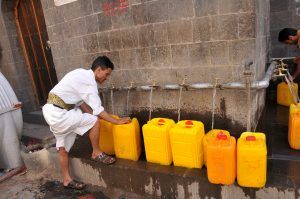
Locals filling their bottles with public waters. Sanaía, Yemen Photo: Foad Al Harazi / World Bank
We know that the dividends from investing in water, sanitation, and hygiene (WASH) through open government reforms are significant. Yet, according to OGP data, WASH is one of the less explored areas in OGP action plans, with only nine countries currently implementing relevant commitments. The ODIN data shows significant room for growth around WASH data.
Most OGP members collect and publish point-of-service and household data. However, these data are not available at lower administrative levels, are not interoperable, and often have restrictive licensing, creating a mosaic of data that can be difficult to integrate and act upon.
The figure below shows the availability of water data on the websites of national statistical organizations of OGP countries.
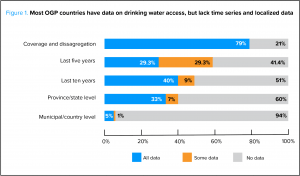
Source: Open Data Watch Open Data Inventory 2017, Access to drinking water data (n=79)
By analyzing ODIN data we see that:
- Four out of five OGP countries publish data on household access to drinking water (coverage and disaggregation, 79 percent).
- Over two-thirds (68 percent) have data covering three of the last five years, while only a quarter (29 percent) have data for all of the last five years .
- Some data are widely available at the national level, and a third (33 percent) have the data at the provincial, state, or regional level, but few (5 percent) maintain municipal-level data. This may be due in large part to the fragmented nature of such information or, in some cases, lower levels of data may not exist in a shareable format. This is an area for particular improvement in OGP countries.
Health

Little Gevorg at eye check-up at the Hrazdan Medical Center, Kotayk region. Armenia. Photo: Armine Grigoryan/World Bank
Addressing health issues is key to driving development outcomes, including more inclusive, sustainable growth across all economies. Opening government data provides an important means of tackling the complexity of today’s global health challenges. Open data advocates from a number of organizations have mapped the coverage, disaggregation, and openness of data for health.
ODIN data shows availability of public data on health facilities, health outcomes, and maternal and reproductive health. With regards to health outcomes, most OGP countries collect and publish some data on the indicators measuring immunization rates, disease prevention, and health maintenance, but few publish data on these indicators in a comprehensive manner (see Figure 2).
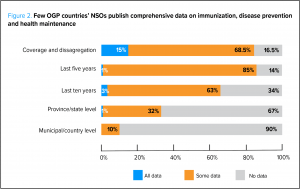
Source: Open Data Watch Open Data Inventory 2017, Health outcomes (n=79)
We see that:
- Before 2018, data are patchy. Almost all (86 percent) OGP countries have some of the data for three of the last five years or five of the last ten years, but very few have annual coverage.
- One OGP country has data available for all provinces. Another 25 percent have partial coverage. The vast majority have no disaggregated data by geography.
Education
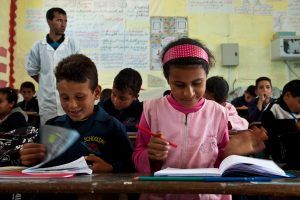
Sogman primary school is the second biggest school in the district of Sejnane and counts 263 pupils, 3 levels and 11 teachers. Pupils in the French class are between 9 and 10 years old (Photo: Arne Hoel)
While a broad range of tools can improve access and quality of learning, open government approaches of access to information, civic participation, and public accountabilityAccording to OGP’s Articles of Governance, public accountability occurs when ”rules, regulations, and mechanisms in place call upon government actors to justify their actions, act upon criticisms ... More can be equally as important. Achieving more inclusive, sustainable outcomes requires efforts beyond transparencyAccording to OGP’s Articles of Governance, transparency occurs when “government-held information (including on activities and decisions) is open, comprehensive, timely, freely available to the pub... More alone. It requires sustained investment in institutions that can enhance participation and accountability and help education systems become more responsive to public needs (e.g., parent-educator accountability).
The report looked at some examples of using comparable, school-level education data to improve accountability in education systems to demonstrate how future OGP action plans might contribute to service delivery improvements. The ODIN data links to the primary source material on national statistical office (NSO) websites and covers every OGP country. Overall, ODIN data tracks the availability and coverage of the number of schools, number of teaching staff, and the annual education budget available in national statistical systems, including ministries of education. Notably, it shows that there are significant gaps in current national-level data.
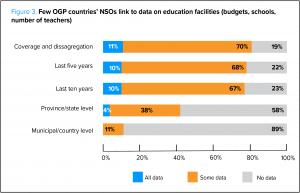
Source: Open Data Watch Open Data Inventory 2017 Indicator 2.1-2.3 (n=79) Elements of coverage
We see that:
- 11 percent of OGP countries have all data available and disaggregated by student age groups, school levels (primary, secondary, and tertiary), and school types (public, private, and religious). Most OGP countries have some data available. Most OGP countries (about 78 percent) with basic data on schools do have the data available over the course of several years.
- Most national statistical systems surveyed (88 percent) do not have data available for provincial and local levels of administration.
Why ODIN Data was Selected
The OGP Global Report team used a list of defined criteria to select the datasets that are featured in the report. The three important principles that guided the selection process were real-world relevanceAccording to the OGP Articles of Governance, OGP commitments should include a clear open government lens. Specifically, they should advance at least one of the OGP values: transparency, citizen partic... of the data, actionability, and interpretability. Specifically, the goal was to create a comprehensive—yet simple-to-understand—framework that readers could use to easily identify real-world issues and solutions. The OGP Global Report team selected ODIN because of a) geographical coverage – the 2018 edition covered 178 countries, including all 79 OGP member countries; b) policy area relevance – the dataset includes assessments of the coverage and openness of datasets related to public services; c) transparency – there is underlying data available that explains top-level scores.
In the Global Report, ODIN data are featured in the water and sanitation, health, and education sub-dimensions in the individual member pages, as well as the “priority areas for reform” sections on the same topics. The data are also linked on the recently revamped OGP website, where viewers can review member pages and click through to the specific ODIN indicators used via the “Sources” link.
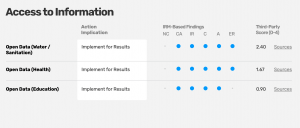
↙
We hope to continue using ODIN in the future
As part of the review of the report, more than 42 governments and dozens of experts provided written comments on the text and the country pages. This provided invaluable feedback on the work, especially from the perspective of those that work with open data providers and National Statistical Offices. While a number of national governments were concerned with the data (especially around water and sanitation where often local governments have a primary role), none of them showed that ODIN was inaccurate.
We would love to continue using ODIN data. We found it to be accurate, precise, and relevant. While some members might object to the heavy emphasis on NSOs, it fits well with OGP’s mission of improving national systems and the hard-working reformers within them. It lays out clear work that we need to achieve going forward if we are to have actionable data that results in real social change. In some cases, geographic coverage is a major issue, and in nearly all, we seem to be at the very beginning (in most countries) of scaling the mountain of disaggregation to the regional and local levels where people will do their work.
We want to thank the team at Open Data Watch for their inputs to the Global Report and for reviewing this blog. We look forward to continuing our partnership!
*For the publication of the Global Report, OGP used ODIN data available as of December 31, 2018. Our online data platform will be updated on an ongoing basis to reflect updated trends.

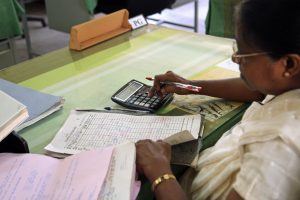

Leave a Reply